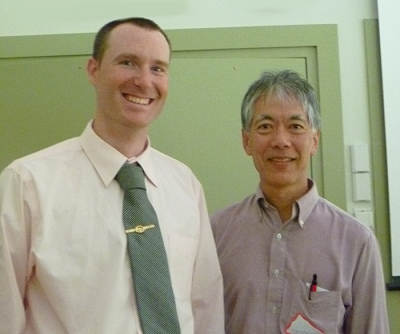
Christopher LaBreck, associate principal and PBIS team leader for West Boylston Middle/High School (left) and keynote speaker George Sugai, PhD, a PBIS pioneer, shared national and local perspectives at the Central Massachusetts PBIS Schools Showcase.
A sixth-grader falls and hurts her foot in gym; rather than laugh, a classmate comforts her. A concerned 12-year old tells a teacher that a couple of boys are teasing another child who is afraid to speak up. An eighth grader helps a struggling classmate study.
When kids like these at West Boylston Middle School are seen by their teachers and classmates doing something that shows they know how to “be respectful, be responsible and participate”—expectations they have been taught to recognize, and agreed to meet—they are honored in the school’s monthly newsletter.
The students’ good behavior, and the recognition they get for it, are Positive Behavioral Intervention and Supports (PBIS) in action. Developed as an alternative to traditional disciplinary approaches in public schools, PBIS emphasizes positive ways to reinforce and teach appropriate behavior, such as catching kids doing good deeds and honoring them as peer role models. With training and support from the Department of Psychiatry’s Central Massachusetts Communities of Care (CMCC), West Boylston and other Central Massachusetts school districts are embracing PBIS as a way to help create a school atmosphere where students know and model positive behavior school-wide.
“Teaching behavior as relentlessly as we teach reading or other academic content is the ultimate act of prevention, power and promise,” said George Sugai, PhD, professor of education, director of the Center for Behavioral Education & Research and co-director of the Center of Positive Behavioral Interventions & Supports at the University of Connecticut. Recognized as the pioneering creator of PBIS, Dr. Sugai was the keynote speaker at the Central Massachusetts PBIS School Showcase hosted by CMCC on June 2. In addition to the PBIS team from West Boylston, educators and administrators from Auburn, Charlton, Clinton, Leominster, Milford, Winchendon and Worcester were on hand. Also in attendance were special guests Joan Mikula,
assistant commissioner of child and adolescent services for the Massachusetts Department of Mental Health (DMH), and Marcia Mittnacht, director of special education for the Massachusetts Department of Elementary and Secondary Education (DESE).
In collaboration with DESE, the Worcester Public Schools and Sugai and his colleagues, CMCC has provided training and technical assistance to 28 schools in 15 school districts since 2007. PBIS team members from a number of these schools gathered at the PBIS Schools Showcase to compare notes and share their successes—including up to a 50 percent reduction in the number of times students were sent to the office for disruptive or negative behavior, with a corresponding reduction in suspension and expulsion rates.
“PBIS has been successful in West Boylston because faculty have embraced it,” said Christopher LaBreck, associate principal for West Boylston Middle/High School, describing how each teacher has created a matrix for the classroom with the same three expectations, and reviews it regularly with students to increase the consistency of behavior that meets expectations. “Now the task is to create systematic interventions for those students who need more support.”
Because PBIS is a tiered system in which the lowest intensity interventions are effective for the majority of students, schools with PBIS programs are also better able to help those few children with emotional impairment who require more intense intervention and support, including mental health care and the kind of community-based “wraparound services” developed and delivered by CMCC. In addition to improving school climate and performance for all students, a specific purpose of the partnership between CMCC and local public schools is to identify at-risk students who are in need of mental health services.
“Many of the children we serve are struggling in schools. They do much better in schools with PBIS,” said Suzanne Hannigan, CMCC project director. “Once involved, schools see the value of our wraparound services model and want to become more involved in a team approach with the child.”
“Through PBIS training for hundreds of educators who work with thousands of children, we are proud to have made a substantial impact.” said Eugene Thompson, MSW, MPH, assistant project director for Evidence Based Practices at CMCC and a driving force behind the Central Massachusetts PBIS initiative. “The educators here today really show what PBIS can do.”
|
Communities of Care and wraparound services |
 First funded as a pilot program in 1999 and now in its 12th year, Communities of Care is dedicated to providing a welcoming environment in which all youth with complex emotional and behavioral needs, and their families, can get the help they need to live happy and productive lives within their communities. Communities of Care uses an innovative “wraparound service” model for treating youth with severe emotional disturbance, the diagnosis of a psychiatric disorder in a child under 18 years of age that has resulted in functional impairment that substantially interferes with, or limits, the child’s role or functioning in family, school or community activities.
First funded as a pilot program in 1999 and now in its 12th year, Communities of Care is dedicated to providing a welcoming environment in which all youth with complex emotional and behavioral needs, and their families, can get the help they need to live happy and productive lives within their communities. Communities of Care uses an innovative “wraparound service” model for treating youth with severe emotional disturbance, the diagnosis of a psychiatric disorder in a child under 18 years of age that has resulted in functional impairment that substantially interferes with, or limits, the child’s role or functioning in family, school or community activities.